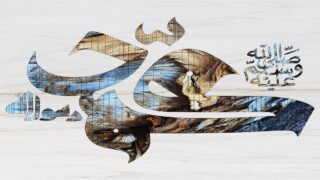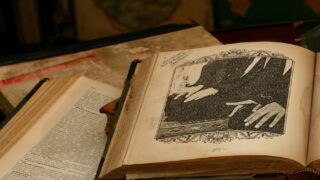When the Prophet reached home after his sojourn in the mountain cave, his wife noticedthat he was off-color, which was natural after all the excitement of his first encounter with the Angel Gabriel.
She asked him what was the matter as she started to wipe his face. She asked whether he had seen or heard anything new. He told her: “You remember what I told you about my dreams and the voice I used to hear when I awoke, which caused me some fear!
It was Gabriel who appeared and talked to me and made me read words which left me worried. He then told me that I am the Prophet of this nation. As I was coming back, I heard trees and stones saying: “Peace be to you, Messenger of God.”
Khadijah said: “Rejoice! By God, I was certain that God would bring you only what is good. I certainly hope that you are the Prophet of this nation.”
She continued to encourage him until he relaxed and ate. She then went to her cousin, Waraqah ibn Nawfal, who reassured her. He promised her most solemnly that if Muhammad was truly the Prophet who is mentioned in the Torah and the Gospel, “and he calls people to believe in his message while I am still alive, I will do my best in obedience to God’s Messenger and will support him to the end.”
There are several reports about the encouragement Waraqah gave to Khadijah and the Prophet. If we take them together, there were probably two or three meetings between the Prophet and Waraqah, one of which occurred when they met at the Ka`bah as both of them were doing the tawaf, or the circumambulation around the Ka`bah.
Waraqah reassured Muhammad and kissed his head. Then Waraqah died within a few days. The Prophet said of him: “I have seen in my dream the priest wearing silk clothes in heaven, because he believed in me.” (Ibn Hisham)
The first few days must have been full of worry in the prophet’s home. He needed every possible reassurance. It seems that Gabriel appeared to him more than once.
His wife Khadijah was certain that nothing evil could come to him. Her logical thinking led her to that conclusion. What she knew of the Prophet’s character made her absolutely certain that what he saw and heard was genuine and came from a good source.
Her thoughtful mind led her to try to get more reassurance. She said to the Prophet: “Cousin, can you tell me when this companion of yours comes to you next time?” He agreed to do so.
Informed of Gabriel’s presence on his next visit, Khadijah said to the Prophet: “Cousin, sit on my left thigh.”
When he did so, she asked him whether he still saw him. The Prophet said: “Yes.”
She told the Prophet to mover over and sit on her right thigh. As he did so, the Prophet confirmed that he could still see Gabriel. She asked him to sit on her lap and he did so, again confirming that he soulc still see him.
She then took off her head-covering, while the Prophet still sat on her lap. At that moment, he told her he could see him no more. She said, “Rejoice, Cousin, and be firm. This is certainly an angel, not a devil.”
It was her clear thinking that led her to try this method, realizing that an angel would not stay in a room where a man and his wife were in a closely intimate position. (Ibn Hisham 255)
Then followed a period during which the Angel Gabriel stopped coming to the Prophet. It seemed that it all stopped as suddenly as it had started. Now, no more visits by Gabriel and no more revelations. This worried the Prophet and he needed reassurance again.
There are no confirmed reports of the duration of this period during which the Prophet reveived no new revelations. One report puts it at two and a half years, but it is more likely that it was much shorter than that, lasting perhaps about a month or a few weeks. (Ibn Hisham 257)
The purpose was to allow the Prophet to have some time to himself, during which his new experience would sink in and he would be able to evaluate the new situation and its implications for his future role.
What he was embarking on was by no means easy. It required strength, fortitude and perseverance. Of all these he had plenty, but his task needed even more.
Moreover, the process of receiving revelation was by no means easy. No human being can tell what it meant, simply because no human being has ever experienced it, apart from those chosen elite whom God has honored so highly to make them prophets.
What is important to remember, however, is that the receipt of revelation was an actual contact between the Prophet, Muhammad, the human being, and an angel God sent specially to him to give him His own words. The process itself took several forms.
From the two hadiths, quoted earlier in this chapter, relating the first encounter between the Prophet and the Angel Gabriel, one can realize that revelation could be given to the Prophet while he was asleep or he was awake.
In that particular instance, both types might have occurred, first during the Prophet’s sleep, and then confirmed when he was awake.
Alternatively, it could come through direct inspiration. In an authentic hadith, the Prophet is quoted to have said: “The Holy Spirit has given me this inspiration that no soul shall die until it has completed its life duration and received all its provisions. Be mindful, therefore, of your duty towards God and maintain propriety when you ask Him for what you want.”
Or the revelation could be given to him while a ringing noise was heard. That was the most difficult form. It is suggested that with that ringing sound, his mind was at its most alert.
Or the angel could come to him in human form. In particular, he appeared in the form of one of the Prophet’s companions, Dihyah ibn Khalifah, who was exceptionally handsome.
Or the Angel Gabriel could appear to Muhammad in his own shape, as an angel with wings.
Or finally, God could speak to him directly, either when he was awake, as on his night journey, or during his sleep as the Prophet has once reported:
“My Lord appeared to me in the most splendid form, and said: ‘Over what do the Supreme Society dispute?’
I said I do not know. He put his palm on my chest and I felt its coolness and knowledge of everything became clear to me.
He said: ‘Muhammad, over what do the Supreme Society dispute?’
I said: ‘Over atonements.’
He said: ‘What are they?’
I said: ‘Ablution after what is disliked, moving forward to do what is good and watching for the time of prayer, one after the other. If a person does this, he is praised during his life and at his death. His sins will be wiped out and he will be like a newborn child.'” (At-Tirmidhi)
Aishah reported that when the Prophet received revelations, he always sweated, even on the coldest of days.
All this meant that the Prophet had to go through a transitional period during which he would taste part of the complete transformation that was going to take place in his life.
During this transitional period, there was no need for new revelations. Only reassurance was needed that what he had seen and heard was true and real. He was a Prophet chosen by God for a great task.
When the transitional period was over, revelations resumed. Jabir ibn Abdullah quotes the Prophet as saying:
“As I was walking, I heard a voice from heaven. I lifted my eyes to the sky and I saw the angel who had come to me in Hira’ sitting on a chair raised between heaven and earth. I sat down in terror and fell. I then rushed home and said to my wife: ‘Wrap me! Wrap me!’ God revealed to me: ‘O you enfolded [in your coverings] arise and warn…'(74:1-7)” From now on, Muhammad was not only a Prophet, he was also a Messenger. From now on, he was to receive revelations without worrying interruptions.
* By Adil Salahi
















